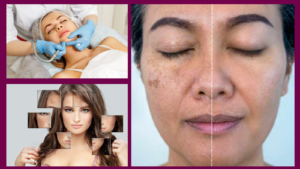There are so many skincare products available in the market that finding what works for you is a task. Natural Skincare Products vs Synthetic Skincare products are among the biggest debates in the skincare industry. Both kinds have their benefits, but how do you know which one is right for your skin?
In this blog, we will take a closer look at natural vs synthetic skincare products, their pros and cons, and how you can make an informed choice. We’ll also tell you about the top dermatologists who recommended some best skincare products for your skin.
Table of Contents
What Are Natural Skincare Products?
Natural skin products are derived from plants, minerals, and other natural substances. These products are free from synthetic chemicals, preservatives, or artificial fragrances. Examples of natural ingredients are aloe vera, green tea, essential oils, and plant-based oils like jojoba or coconut oil.

Benefits of Natural Skincare Products:
- Gentle on Skin: Natural skincare products do not use harsh chemicals, they are often better for sensitive skin types and less likely to cause irritation and allergic reactions.
- Free from Harmful Chemicals: A lot of synthetic skincare products have parabens, sulfates, and phthalates which may not be good for your skin if absorbed. Natural products are often a safer option.
- Eco-Friendly: Natural skin care products are typically more natural for the environment. They are made from biodegradable ingredients and sustainably sourced ingredients, making them a more eco-friendly option.
- Nutrient-Rich: Many natural ingredients are loaded with vitamins, antioxidants, and other nutrients that help keep the skin healthy and fight the effects of premature ageing.
Drawbacks of Natural Skincare Products:
- Shorter Shelf Life: Natural skin care products may not have as long a shelf existence as synthetic preservatives. That can render them less practical, especially for consumers wanting long-term storage.
- Potential for Allergies: Natural ingredients are generally mild, but some people may still experience allergic reactions to specific plant-based extracts. Thus, always perform a patch test before use.
- Less Effective for Certain Skin Concerns: Natural products also may not be as effective for treating severe skin conditions like acne or hyper-pigmentation, whereas synthetic formulations can at times be more precise and effective.
What Are Synthetic Skincare Products?
Synthetic skin care products are products made from chemicals that mimic natural substances when developed in a laboratory setting. These products generally contain preservatives, fragrances, and various chemicals that help prolong their shelf lives and improve their efficiency.

Benefits of Synthetic Skincare Products:
- Longer Shelf Life: Synthetic skincare products contain preservatives to prolong their shelf life so that they can stay effective and stable for longer.
- Targeted Treatments: Most of the synthetic products available are formulated to target specific skin problems like acne, wrinkles, or pigmentation. These products often contain active ingredients, such as retinoids, salicylic acid, or benzoyl peroxide, which can provide faster, visible results.
- Consistency in Formulation: Synthetic skincare products are typically stable in quality, so every bottle or jar gives the same experience, unlike some natural products that can change with seasonal harvests.
Drawbacks of Synthetic Skincare Products:
- Potential for Skin Irritation: Certain synthetic chemicals can irritate the skin, dry it out, or cause allergic reactions to those with sensitive skin. Harsh preservatives and artificial fragrances are frequent offenders.
- Environmental Concerns: Synthetic skincare products are generally associated with environmental pollution due to the production of the chemicals involved in making them unless the ingredients are renewable or bio-degradable.
- Possible Toxicity: Many synthetic chemicals found in these products have gained popularity for being potentially toxic after long-term exposure, and some have even been associated with hormone disruption and similar health problems.
Natural Skincare vs. Synthetic Skincare: Which Is Better for Your Skin?
The debate over natural vs synthetic skincare products ultimately depends on your skin type, concerns, and preferences. Although natural skincare products have a gentler approach and usually lack harmful chemicals, synthetic skincare products often provide targeted treatments that yield faster results.
For Sensitive Skin:
Sensitive skin or reactive skin may benefit more from natural skincare products. There are fewer chances of irritation because they keep harsh chemicals and fragrances to a minimum. But beware of any plant-based ingredients you may be allergic to.
For Anti-Aging or Acne Treatment:
Synthetic skincare products can also be a lot better for treating a specific concern like acne, fine lines wrinkles, etc. Active ingredients like retinoids, hyaluronic acid, and salicylic acid that are more commonly found in synthetic formulations can help target these issues much more precisely.
For Daily Maintenance:
Natural skincare products are mainly used for daily maintenance of your skin. They’re best for moisturization, calming, and shielding your skin from environmental pollutants. But if you need more targeted treatment, you might also want to add synthetic products to your routine.
Combining Natural and Synthetic Products for Optimal Results:
Many skincare enthusiasts find that the best approach is to mix both natural and synthetic skincare products into their routines. You can apply natural skin care products for hydration or nourishment and synthetic skincare products for specific treatments like anti-ageing or acne.
For example, you may use a natural cleanser and moisturizer but a synthetic serum may target wrinkles or a spot treatment for acne. This hybrid approach, when executed well, can help get the best results.
Why Consult Dr. Priyanka Aggarwal for Skincare Advice?
Having an expert opinion on the right skincare product to use is essential, especially when you are dealing with certain skin concerns. One of the best dermatologists in Kolkata, Dr. Priyanka Aggarwal can help you negotiate the natural versus synthetic skincare product debate. She is knowledgeable and will evaluate your skin type, suggesting perfect products for you to use and advising you on designing an effective skin care program that works for you.
If you want to try natural skincare products or use more targeted synthetic solutions, Dr Priyanka Aggarwal makes sure to give you safe, effective, and personalized skincare recommendations.
Conclusion:
There is no absolute right answer in the natural vs synthetic skincare product debate. Natural products are usually gentler and more eco-friendly but synthetic ones may provide specificity treatments and longer shelf life. The best way to do it ultimately depends on your skin type and respective concerns.
Ultimately, it’s about finding the right balance for your skin. Whether you use natural skincare products or synthetic skincare products, always choose the best quality that is comfortable for your skin. If you are still in doubt, reach out to a trusted dermatologist, like Dr Priyanka Aggarwal for guidance according to your skin’s needs.
Read more: How Pollution Affects Your Skin: Tips to Protect and Repair Damaged Skin
Are natural skincare products always safer than synthetic products?
No, natural skincare products are not always safer than synthetic ones. Some natural ingredients may be allergenic or irritating, while just as many synthetic ingredients are intensively formulated and tested for safety and can be used on sensitive or problematic skin.
Do natural ingredients provide sun protection?
A few natural ingredients, like zinc oxide, titanium dioxide, and red raspberry seed oil, provide some sun protection. But they may not have broad spectrum coverage the way that synthetic sunscreens do, so it’s important to find products with proven SPF ratings so that you are getting the protection you need.
Are essential oils safe for all skin types?
Not all skin types are safe to use essential oils. They may irritate, and cause allergies or sensitivity, particularly on sensitive or acne-prone skin. These oils should always be properly diluted, and a patch test performed before application to the skin.






Pingback: Synthetic Skincare Products: Are They Safe and Effective? – blog
Pingback: How Your Job Affects Your Skin Health - Dr. Priyanka Aggarwal